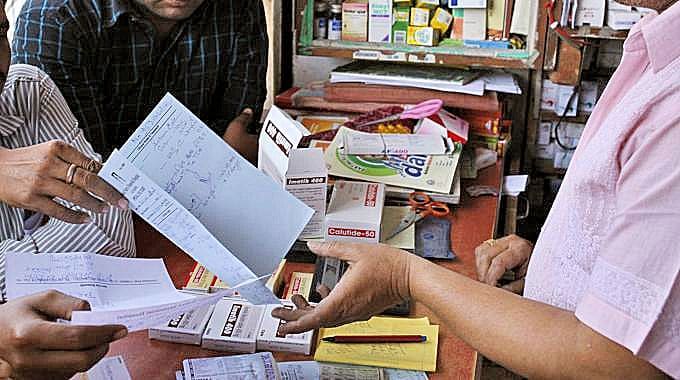
The hearings taking place today concern a patent opposition filed by lawyers of the Initiative for Medicines, Access & Knowledge (I-MAK) in November 2013, together with the Delhi Network of Positive People (DNP+). In the opposition it is argued that sofosbuvir is not scientifically innovative and therefore does not require the need to obtain a patent in India. MSF, which relies on generic medicines for its medical activities around the world, supports this effort to make sofosbuvir generically producible.
Patent applications for sofosbuvir have been rejected in Egypt, China and Ukraine, and other patent oppositions have been filed in Argentina, Brazil, Russia, Thailand and the European Union.
People living with Hepatitis C and HIV have gathered outside the patent office in Delhi to urge officials not to blindly and quickly grant patents to multinational drug corporations. The Indian government is under heavy pressure from companies and the US government to weaken the effectiveness of patent policies and grant them more easily.

Gilead put sofosbuvir on the US market in late 2013 at a price of $1,000 a pill ($84,000 for a 12-week treatment) and set similarly high prices in developed countries. The company has licensing deals with several manufacturers in India who have developed and are starting to market generic versions, but the deals exclude a number of middle-income countries with high rates of hepatitis C. This leaves about 49 million people in these countries – or more than the 40% of all people with hepatitis C worldwide – without access to this drug..
“Gilead wants the world to believe that its licensing deals have solved the problem of global access to this drug but today countries like Thailand, Malaysia and Brazil have to pay the corporation thousands of dollars for sofosbuvir when Indian generic versions are now available for just $335 for a 12-week treatment,” he explains Tahir Amin, lawyer and co-founder of I-MAK. “Questi accordi di licenza permettono alla Gilead di controllare i propri concorrenti in India e sono un tentativo di convincere l’ufficio brevetti che meritano un brevetto per una formulazione che si basa su dati scientifici obsoleti”.
“Gilead argues that the price of the drug is the value it provides, but a cure that almost no one can afford is useless,” says Isabelle Andrieux-Meyer, viral hepatitis expert for MSF. “We have started treating people with hepatitis C in several countries, and we want to do it more and more, but we can only convince governments to invest in treatments if they are available at affordable prices wherever they are needed. Restrictive patent and licensing agreements shouldn't hamper middle-income countries' efforts to provide people with the treatments they need to stay alive."
L
“Hepatitis C drugs like sofosbuvir are relatively simple and cheap compounds to produce,” explains the dottor Andrew Hill, un farmacologo dell’Università di Liverpool which has published a study demonstrating that sofosbuvir can be produced for as little as $101 for a 12-week course of treatment. “Gilead has already sold more than $32 billion worth of Hepatitis C treatments in just two years, resulting in a profit of $18 billion last year alone. The continued profit projections of oral hepatitis C drugs are impressive and are not justified by manufacturing costs.
Related news: Hepatitis C. WHO alert on counterfeit medicines circulating in South East Asia
NB.: l sofosbuvir è stato scoperto da Pharmasset e poi acquisito per lo sviluppo da Gilead Sciences. Il 6 dicembre 2013, la US Food and Drug Administration ha approvato definitivamente il farmaco per il trattamento dell’epatite cronica C. In data 22 novembre 2013 l’European Medicines Agency (EMA) ha raccomandato l’approvazione del farmaco per l’Unione europea; dall’ottobre del 2013 il farmaco è approvato per uso compassionevole prima o dopo il trapianto epatico. È commercializzato in Italia come Sovaldi; dal marzo 2013 è prescrivibile da parte dei centri autorizzati dall’Agenzia Italiana del Farmaco, per pazienti affetti da epatite cronica C in fase avanzata di malattia o con cirrosi epatica. In Italia Harvoni (ledipasvir 90 mg/sofosbuvir 400 mg), sempre di Gilead Sciences, indicato per curare l’infezione cronica da virus dell’epatite C di genotipo 1 e 4 nei pazienti adulti, è disponibile dal 3 giugno 2015, ed è dispensato “in regime di rimborsabilità A-PHT (prontuario della distribuzione diretta) vincolata ai criteri di eleggibilità previsti nella scheda di registro Aifa. L’innovatività di Harvoni consiste nell’estrema semplificazione dello schema terapeutico e soprattutto nell’applicabilità della cura senza associare altri farmaci.
